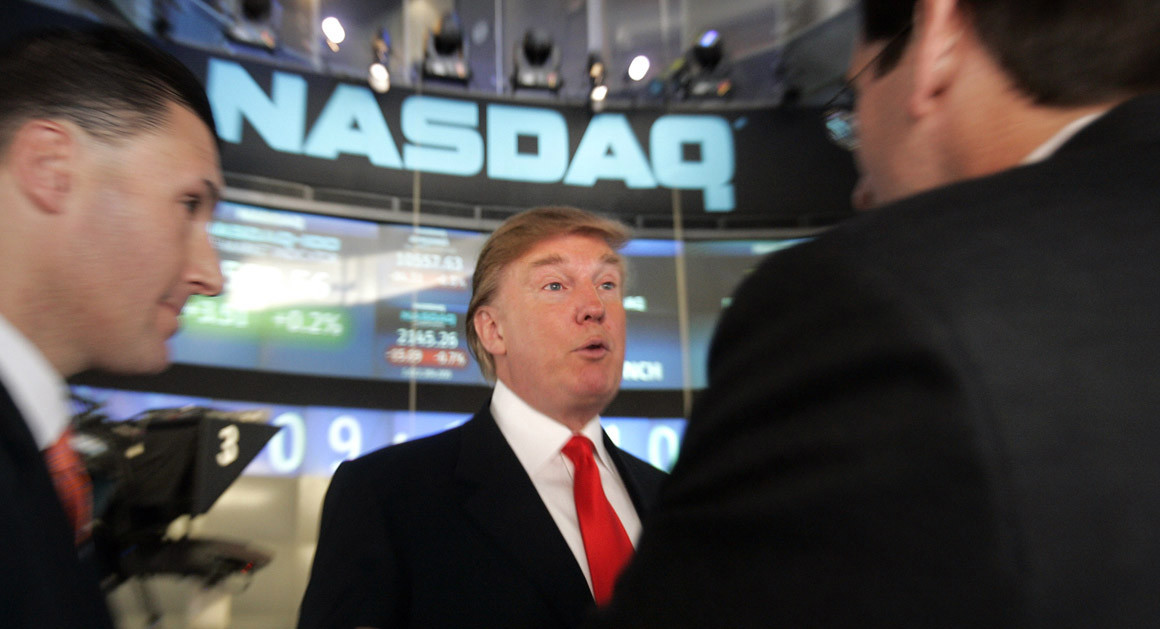Economy
Futures Climb Off Worst Levels But Still Point to Lower Open

By Investors Hub
The major U.S. index futures have climbed off their worst levels of the morning but currently continue to point to a modestly lower opening on Thursday following the strength seen on Wall Street over the two previous sessions.
A negative reaction to quarterly results from Morgan Stanley (MS) may generate early selling pressure, with the financial giant down by 3.7 percent in pre-market trading.
Morgan Stanley is likely to see initial weakness after reporting fourth quarter earnings and revenues that came in below analyst estimates.
Renewed trade concerns may also weigh on Wall Street after a report from the Wall Street Journal said federal prosecutors are pursuing a criminal investigation of China?s Huawei Technologies for allegedly stealing trade secrets from U.S. partners.
However, the futures regained ground following the release of a report from the Philadelphia Federal Reserve showing a significant acceleration in the pace of growth in regional manufacturing activity in the month of January.
Stocks moved mostly higher over the course of the trading day on Wednesday, adding to the gains posted on Tuesday. With the continued upward move, the major averages reached their best closing levels in a month.
The major averages ended the day in positive territory but well off their highs of the session. The Dow climbed 141.57 points or 0.6 percent to 24,207.16, the Nasdaq rose 10.86 points or 0.2 percent to 7,034.69 and the S&P 500 edged up 5.80 points or 0.2 percent to 2,616.10.
The continued strength on Wall Street partly reflected a positive reaction to upbeat earnings news from financial giants Bank of America (BAC) and Goldman Sachs (GS).
Shares of Bank of America moved sharply higher trading after the company reported fourth quarter results that beat analyst estimates on both the top and bottom lines.
Goldman Sachs also saw substantial strength after reporting fourth quarter earnings and revenues that exceeded expectations.
Buying interest was somewhat subdued, however, as traders continued to express uncertainty about the ongoing government shutdown.
Stocks remained mostly positive after British Prime Minister Theresa May’s government survived a vote of no confidence in parliament.
The U.K.’s House of Commons defeated the motion raised by the leader of the main opposition Labour party Jeremy Corbyn by a vote of 325 to 306. The no-confidence vote came a day after May’s Brexit deal was voted down 432 to 202.
The Federal Reserve also released its Beige Book this afternoon, with the report saying economic activity has continued to increase in most of the U.S. but also hinting at a deterioration in optimism.
The Beige Book, a compilation of anecdotal evidence on economic conditions in the twelve Fed districts, said eight of the twelve districts reported modest to moderate growth.
Looking ahead, the Beige Book said outlooks generally remained positive, although many districts reported that contacts had become less optimistic.
The drop in optimism reflected increased financial market volatility, rising short-term interest rates, falling energy prices, and elevated trade and political uncertainty.
In other U.S. economic news, the Labor Department released a report showing another steep drop in import prices in the month of December, reflecting a continued nosedive in fuel prices
The Labor Department said import prices tumbled by 1.0 percent in December after plunging by a revised 1.9 percent in November.
Economists had expected import prices to plummet by 1.3 percent compared to the 1.6 percent slump originally reported for the previous month.
The report said export prices also fell by 0.6 percent in December after sliding by a revised 0.8 percent in November. The drop in export prices matched economist estimates.
A separate report from the National Association of Home Builders showed an unexpected improvement in homebuilder confidence in January.
The report said the NAHB/Wells Fargo Housing Market Index rose to 58 in January after slumping to 56 in December. Economists had expected the index to come in unchanged.
The notable decrease seen in the previous month dragged the housing market index down its lowest level since hitting 54 in May of 2015.
Financial stocks turned in some of the market’s best performances on the day following the results from industry giants Bank of America and Goldman Sachs.
Reflecting the strength in the financial sector, the NYSE Arca Broker/Dealer Index and the KBW Bank Index surged up by 2.9 percent and 2.5 percent, respectively.
Notable strength was also visible among steel stocks, resulting in a 1.1 percent advance by the NYSE Arca Steel Index.
On the other hand, computer hardware stocks came under considerable selling pressure, dragging the NYSE Arca Computer Hardware Index down by 1.9 percent.
Economy
Minister Woos European Investors With Nigeria’s Steel Industry

By Adedapo Adesanya
Nigeria’s Minister of Steel Development, Mr Shuaibu Abubakar Audu, has told European investors that the country’s steel sector alone consumes about $10 billion annually, presenting a huge market opportunity for serious global players.
In a statement by the Director of Information and Public Relations in the ministry, Ms Salamatu Jibaniya, it was stated that the Minister made this disclosure when he took Nigeria’s industrialisation drive to Germany, declaring that the country is ready to trade its abundant raw materials status and embrace full-scale value addition.
Addressing the Nigeria–German Economic Forum in Dortmund, Mr Audu projected Nigeria as Africa’s next industrial hub, in line with the Renewed Hope Agenda of President Bola Tinubu.
“With a population of nearly 250 million, largely youthful and energetic, Nigeria is primed for industrial take-off,” he said.
He disclosed that the country holds over three billion tonnes of iron ore, alongside vast deposits of limestone, manganese, copper, lead-zinc, lithium and rare-earth minerals, positioning Nigeria for both domestic industrial growth and export expansion.
Mr Audu urged EU investors to key into steel and aluminium production, mineral beneficiation and processing, as well as critical infrastructure development covering power, rail, gas and ports.
He stressed that beyond capital inflow, Nigeria is prioritising technology transfer and technical skills development to strengthen local capacity.
At the high-level forum, the minister was received by Germany’s Minister for Federal, International and European Affairs, Mr Nathanael Liminski; Lord Mayor of Dortmund, Mr Alexander Kalouti; President of the Dortmund Chamber of Commerce and Industry, Mr Heinz-Herbert Dustmann; and Consul General to Slovakia, Mr Klaus Wagener.
Economy
Sunbeth Offers N100bn Commercial Paper to Boost Cocoa Export Value Chain

By Aduragbemi Omiyale
To boost Nigeria’s cocoa export value chain, Sunbeth Global Concepts Limited has secured approval to issue commercial papers worth N200 billion to investors.
In the first tranche, the cocoa exporter will sell the debt instrument worth about N100 billion in three series across three tenors of 180 days, 270 days and 364 days.
Subscription for the CP commenced on Friday, February 27, 2026, and will close on Thursday, March 5, 2026, with allotment and settlement scheduled for Friday, March 6, 2026.
Interested investors can purchase the commercial papers with a minimum of N5 million and in multiples of N1,000 thereafter.
The company stated that proceeds from the exercise would be used to finance contractual working capital requirements, including inventory procurement and the execution of physical and hedged offtake obligations within its export operations.
The Chief Operating Officer of Sunbeth, Mr Nzubechukwu Anisiobi, said the programme reflects the firm’s disciplined capital strategy and strong credit fundamentals.
“The establishment of our N200 billion Commercial Paper Programme reflects our disciplined capital strategy and solid credit profile.
“In a working capital-intensive export business, access to structured short-term funding strengthens liquidity, supports efficient contract execution and preserves balance sheet stability,” he stated.
Further emphasising investor confidence in the company’s governance and risk framework, he noted that, “The Programme underscores the confidence the capital markets have in our governance standards, earnings resilience and robust risk management discipline.”
Sunbeth, which is a top-five non-oil export contributor in Nigeria, was established in 2017 and has exported over 200,000 metric tonnes of cocoa beans and 60,000 metric tonnes of cashew nuts to international markets.
In 2025, it recorded over N600 billion in revenue, reinforcing its scale within Nigeria’s agricultural export ecosystem.
The organisation works directly with more than 30,000 farmers and collaborates with over 250 local buying agents across Nigeria.
Its global strategic partners include Cargill, GCB Group, JB Cocoa, Touton, Macquarie and StoneX, enabling diversified offtake and multi-destination market access across Europe, Asia and the United States.
Economy
Unlisted Securities Market Gains 1.88%

By Adedapo Adesanya
Five price advancers buoyed the NASD Over-the-Counter (OTC) Securities Exchange by 1.88 per cent on Tuesday, March 3, as the demand for unlisted stocks continues to grow.
During the session, the market capitalisation added N46.64 billion to close at N2.524 trillion versus the Monday session’s N2.477 trillion, and the NASD Unlisted Security Index (NSI) increased by 77.94 points to finish at 4,219.47 points compared with the previous day’s 4,141.53 points.
11 Plc gained N13.23 yesterday to sell at N290.23 per share compared with the preceding session’s N277.00 per share, FrieslandCampina Wamco Nigeria Plc appreciated by N7.76 to N117.76 per unit from N110.00 per unit, Central Securities Clearing System (CSCS) Plc improved by N7.05 to N84.05 per share from N70.00 per share, First Trust Mortgage Bank Plc added 17 Kobo to close at N1.92 per unit versus N1.75 per unit, and Industrial and General Insurance (IGI) Plc advanced by 4 Kobo to settle at 49 Kobo per share versus 45 Kobo per share.
On the flip side, Food Concepts Plc dropped 37 Kobo to sell at N3.39 per unit compared with the previous day’s N3.76 per unit, and NASD Plc dipped 20 to N56.21 per share from N56.41 per share.
On Tuesday, the volume of securities went down by 19.6 per cent to 1.4 million units from 1.8 million units, but the value of securities increased by 447.2 per cent to N93.4 million from N17.1 million, and the number of deals soared by 118.5 per cent to 59 deals from 27 deals.
At the close of transactions, CSCS Plc remained the most active stock by value (year-to-date) with 35.8 million units sold for N2.2 billion, trailed by Okitipupa Plc with 6.3 million units worth N1.1 billion, and Geo-Fluids Plc exchanged 122.8 million units valued at N480.4 million.
The most active stock by volume (year-to-date) was Resourcery Plc with 1.05 billion units worth N408.7 million, followed by Geo-Fluids Plc with 122.8 million units worth N480.4 million, and CSCS Plc with 35.8 million units transacted for N2.2 billion.
-

 Feature/OPED6 years ago
Feature/OPED6 years agoDavos was Different this year
-
Travel/Tourism10 years ago
Lagos Seals Western Lodge Hotel In Ikorodu
-

 Showbiz3 years ago
Showbiz3 years agoEstranged Lover Releases Videos of Empress Njamah Bathing
-

 Banking8 years ago
Banking8 years agoSort Codes of GTBank Branches in Nigeria
-

 Economy3 years ago
Economy3 years agoSubsidy Removal: CNG at N130 Per Litre Cheaper Than Petrol—IPMAN
-

 Banking3 years ago
Banking3 years agoSort Codes of UBA Branches in Nigeria
-

 Banking3 years ago
Banking3 years agoFirst Bank Announces Planned Downtime
-

 Sports3 years ago
Sports3 years agoHighest Paid Nigerian Footballer – How Much Do Nigerian Footballers Earn












